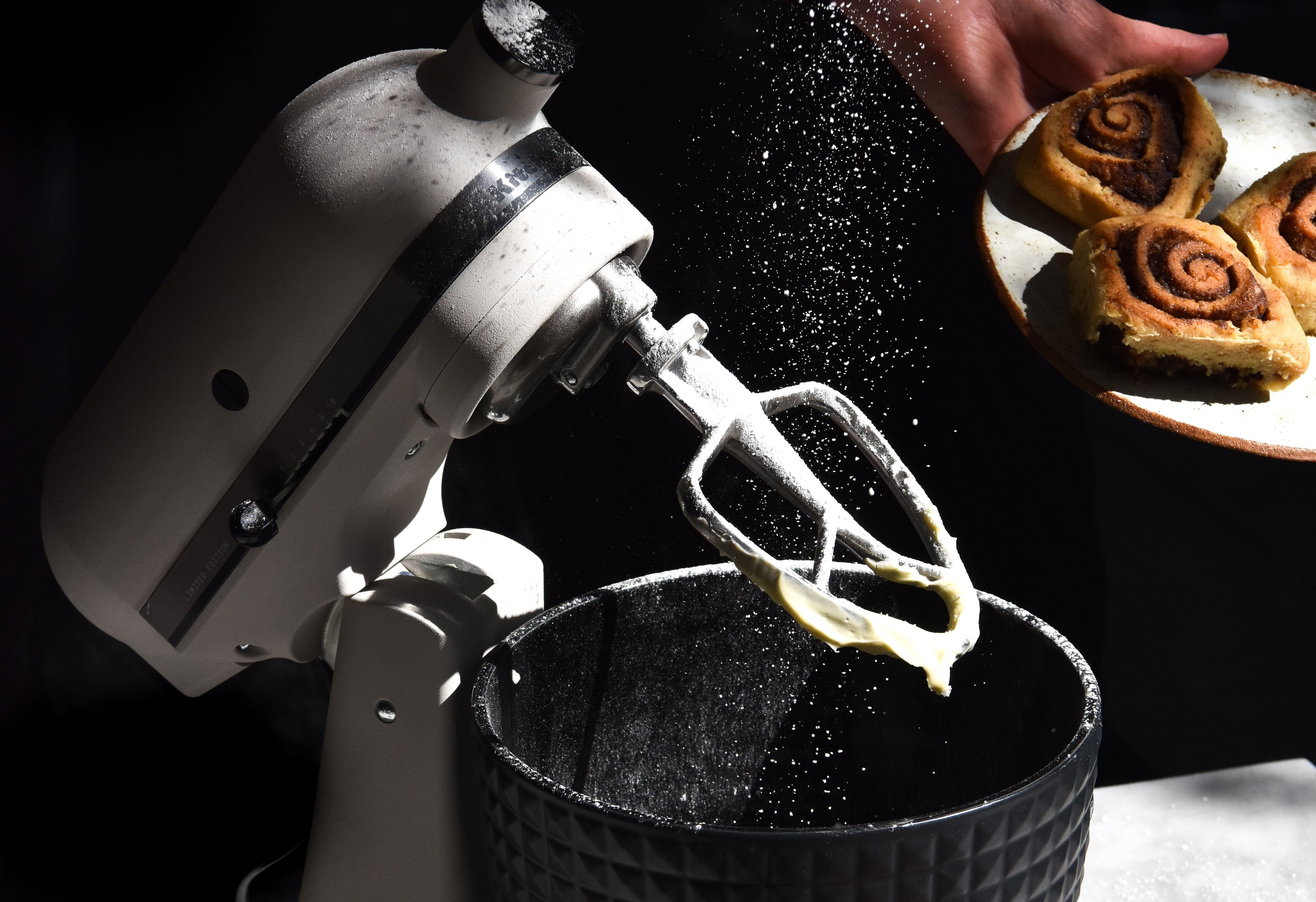Ingredients
- 20g psyllium husk powder
- 250ml milk of choice
- 100g butter
- 3 tablespoons oil of choice
- 240g (1 1/2 cups) fine white rice flour
- 120g (1 cup) glutinous rice flour (also called sweet rice flour or mochiko
- 100g caster sugar
- 1 sachet (7.5g) instant yeast
- 2 tsp baking powder
- 75g melted butter
- 100g light brown sugar
- 1 tbsp ground cinnamon
Method
- To prepare the binder microwave or melt the butter and milk together until liquid and warm. Add the psyllium husk powder to the bowl of your KitchenAid with the whisk attachment, then pour over the milk and butter liquid. Whisk the mixture to ensure the psyllium powder doesn’t clump up.
- If the mixture is hot, allow it to cool a little before adding the eggs so they don’t scramble. Add the oil and whisk to combine. Set aside to thicken for 10-15 minutes.
- While you’re waiting, whisk together the ingredients for the dough. Add the dry ingredients to the binder in the bowl of your KitchenAid. Use the whisk attachment to combine the dough on a medium speed, until a thick, ropey dough forms. If the dough feels too loose to handle, place it in the fridge for 20 minutes.
- TO assemble, ensure dough is chilled and take a large piece of baking paper and oil it with about 1/2 tablespoon of neutral flavoured oil. Distribute it evenly and thoroughly using your hands. Turn the sheet of paper so a long side is facing you. Place the dough onto the centre of the paper and oil your rolling pin. Gently roll the dough out to the size of the sheet of baking paper. Patch up any holes and even out the sides as necessary.
- Use the back of your spoon to drizzle then spread half the melted butter.
- Sprinkle the cinnamon and brown sugar mixture over the top, leaving a 1cm border on the long sides of the dough. Finish with the remaining melted butter. If you like, you can gently press down the cinnamon mixture with your hands. This will help adhere it to the dough, which makes slicing easier.
- Beginning on the long side, use your fingers to fold the 1cm border of the dough up onto itself. You want to create a tight roll, so try and make this first notch as small as possible.
- Continue folding the dough up until you can begin to use the baking paper to roll the dough onto itself. Take it about 80% of the way, then take the far side of the dough and bring it up over the log. You should have a log of dough with the seam facing upwards.
- Grease or line your 20-24cm baking vessel. Take your piece of thread and thread it under the log of dough. Gently thread your piece of string underneath the log
- Eyeball about one eighth of the dough log and think of the string as your knife. Holding one end of the string in each hand, pull in opposing directions to slice through one-eighth of the dough. Gently flip that first cinnamon scroll upright and use your hands to gently cup and mould it. Press it down a little so that it has a solid base, then place it into the prepared baking dish. Repeat with the remaining dough and scrolls.
- Place the cinnamon scrolls in a jumbo ziplock bag or jumbo airtight container. Proof for one hour or until they feel fluffy and have risen a little (it won’t be double).
- About 20 minutes before they finish proofing, preheat your oven to 180C/356F. Place a baking dish filled with boiling water at the bottom of the oven to create a steamy environment. This will help keep them nice and moist during baking.
- After 1 hour, the cinnamon scrolls should have spread a little in the baking dish and feel puffy to the touch. Place them in the steamy oven (stand back as you open it) and bake for 30 minutes. They should feel firm to the touch and be lightly golden on top. Allow them to cool before icing.
- Place all the ingredients for the icing in the bowl of your KitchenAid with the whisk attachment. Beat on a medium – high speed until smooth and fluffy. Dollop the icing onto the cooled cinnamon scrolls and serve.

